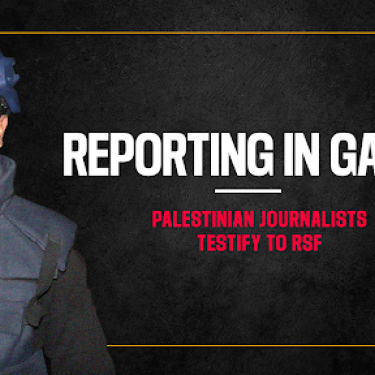Palestinian journalists describe reporting in Gaza to RSF (video)

In Gaza, journalists are trapped in a 40-kilometre-long open-air prison that is bombarded relentlessly, when they or their offices are not being targeted. Amid this tragedy of an unprecedented scale, in the most difficult living and working conditions, they continue to report what is happening. And they have described what this is like to Reporters Without Borders (RSF).
"These professional problems are compounded by the fact that we are under constant pressure happening from air, land and sea strikes everywhere.
Adel Al Zaanoon has been Agence France-Presse’s correspondent in Gaza for the past 27 years. As the airstrikes on Gaza intensified, he had to leave his home and flee to the south of the Gaza Strip, near Rafah. It was during another strike that his wife, a fellow journalist who is RSF’s correspondent, was injured. Adel Al Zaanoon tells RSF about his current existence marked by fear and by constant difficulties finding the basic necessities. He also describes how he struggles to keep reporting during the war engulfing Gaza.
“There’s no security anywhere in the Gaza Strip, not in the north, the south, or the centre.”
Ola Al Zaanoon talks to RSF about her day-to-day existence now in the Gaza Strip and the challenges that journalists have to confront in order to send their reports since the war began on 7 October 2023. Forced to leave her home in the north of the Gaza Strip by the Israeli army evacuation order, Ola sought refuge in the south of the territory, in Khan Younis, on 13 October together with her husband, fellow journalist Adel Al Zaanoon, who is Agence France-Presse’s correspondent, and their twins. She sustained a leg injury while fleeing an Israeli strike on 24 October and had to go to the Nasser Hospital for treatment. It is beside this hospital that journalists have pitched tents in order to take advantage of its Internet access and electricity to work.
"As journalists, we bear witness to bloody scenes that leave indelible scars on our souls, be it the bombings or their aftermath.
Journalist Hani Al Shaer has to work inside the Nasser hospital in Khan Younis in order to have access to electricity and an Internet connection. And because of the difficulties of moving around due to the bombardments, he is almost never able to see his family.
He describes an "appalling situation", with "indiscriminate" and "intensive" bombardments affecting the offices of several media outlets and killing "on average", "one or two journalists" every day in the Gaza Strip. He tells us about the physical and psychological exhaustion and suffering of journalists, confronted with direct threats and daily difficulties that they share with the rest of the population.
